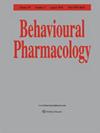低剂量紫杉素 A 免疫可使长期受压的小鼠对抑郁样行为和神经炎症反应产生抵抗力。
IF 1.6
4区 心理学
Q3 BEHAVIORAL SCIENCES
引用次数: 0
摘要
在压力暴露之前刺激先天性免疫系统是一种在压力条件下预防抑郁症的可能策略。基于紫杉素 A 的先天免疫系统刺激活性,我们假设紫杉素 A 可预防慢性应激诱导的抑郁样行为的发生。我们的研究结果表明,在应激暴露前 1 天单次注射 2 或 4 毫克/千克剂量的紫杉素 A,而不是 1 毫克/千克剂量的紫杉素 A,可预防慢性社会挫败应激(CSDS)小鼠抑郁样行为的发生。当紫杉素A与应激暴露之间的时间间隔从1天或5天延长到10天时,单次注射紫杉素A(2毫克/千克)对CSDS诱导的抑郁样行为的预防作用消失,而在第一次注射紫杉素A 10天后注射第二次紫杉素A,以及在应激暴露前10天注射4天(4次,每天一次)紫杉素A则可挽救这种情况。进一步的分析表明,在应激暴露前1天注射一次酶联免疫吸附素A(2毫克/千克)可防止CSDS诱导的海马和前额叶皮层促炎细胞因子的增加。米诺环素(40 毫克/千克)可抑制先天性免疫系统,从而取消紫杉醇 A 对 CSDS 诱导的抑郁样行为和 CSDS 诱导的脑内促炎细胞因子增加的预防作用。这些结果表明,由紫杉素 A 引发的先天性免疫系统激活可防止慢性应激诱发的抑郁样行为和脑部神经炎症反应。本文章由计算机程序翻译,如有差异,请以英文原文为准。
Immunization with a low dose of zymosan A confers resistance to depression-like behavior and neuroinflammatory responses in chronically stressed mice.
Stimulation of the innate immune system prior to stress exposure is a possible strategy to prevent depression under stressful conditions. Based on the innate immune system stimulating activities of zymosan A, we hypothesize that zymosan A may prevent the development of chronic stress-induced depression-like behavior. Our results showed that a single injection of zymosan A 1 day before stress exposure at a dose of 2 or 4 mg/kg, but not at a dose of 1 mg/kg, prevented the development of depression-like behaviors in mice treated with chronic social defeat stress (CSDS). The prophylactic effect of a single zymosan A injection (2 mg/kg) on CSDS-induced depression-like behaviors disappeared when the time interval between zymosan A and stress exposure was extended from 1 day or 5 days to 10 days, which was rescued by a second zymosan A injection 10 days after the first zymosan A injection and 4 days (4×, once daily) of zymosan A injections 10 days before stress exposure. Further analysis showed that a single zymosan A injection (2 mg/kg) 1 day before stress exposure could prevent the CSDS-induced increase in pro-inflammatory cytokines in the hippocampus and prefrontal cortex. Inhibition of the innate immune system by pretreatment with minocycline (40 mg/kg) abolished the preventive effect of zymosan A on CSDS-induced depression-like behaviors and CSDS-induced increase in pro-inflammatory cytokines in the brain. These results suggest that activation of the innate immune system triggered by zymosan A prevents the depression-like behaviors and neuroinflammatory responses in the brain induced by chronic stress.
求助全文
通过发布文献求助,成功后即可免费获取论文全文。
去求助
来源期刊

Behavioural Pharmacology
医学-行为科学
CiteScore
3.40
自引率
0.00%
发文量
84
审稿时长
6-12 weeks
期刊介绍:
Behavioural Pharmacology accepts original full and short research reports in diverse areas ranging from ethopharmacology to the pharmacology of schedule-controlled operant behaviour, provided that their primary focus is behavioural. Suitable topics include drug, chemical and hormonal effects on behaviour, the neurochemical mechanisms under-lying behaviour, and behavioural methods for the study of drug action. Both animal and human studies are welcome; however, studies reporting neurochemical data should have a predominantly behavioural focus, and human studies should not consist exclusively of clinical trials or case reports. Preference is given to studies that demonstrate and develop the potential of behavioural methods, and to papers reporting findings of direct relevance to clinical problems. Papers making a significant theoretical contribution are particularly welcome and, where possible and merited, space is made available for authors to explore fully the theoretical implications of their findings. Reviews of an area of the literature or at an appropriate stage in the development of an author’s own work are welcome. Commentaries in areas of current interest are also considered for publication, as are Reviews and Commentaries in areas outside behavioural pharmacology, but of importance and interest to behavioural pharmacologists. Behavioural Pharmacology publishes frequent Special Issues on current hot topics. The editors welcome correspondence about whether a paper in preparation might be suitable for inclusion in a Special Issue.
 求助内容:
求助内容: 应助结果提醒方式:
应助结果提醒方式:


